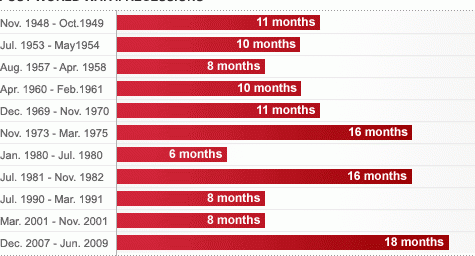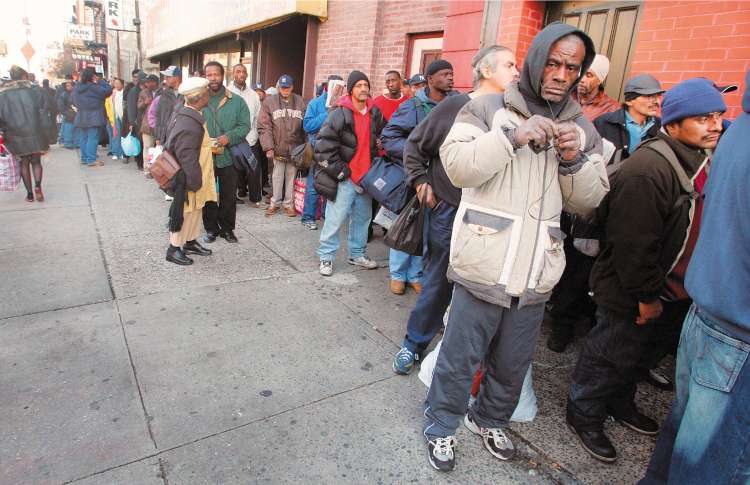The Recession Is Over, Right?
Bruce Bartlett is “astounded” that some financial journalists are taking the fact that the National Bureau of Economic Research hasn’t told us when the recession ended as an indication maybe the recession hasn’t actually ended.
No, Bartlett explains, he is “100% certain that every member of the Business Cycle Dating Committee knows perfectly well that the recession ended some time ago.” The only question is the precise date. “The committee’s problem is that many key indicators of economic activity, such as real GDP, are revised so often and to such a large extent that economic history is continually being rewritten.” So, it’ll take awhile to nail it down.
Kevin Drum points out that we shouldn’t be surprised, given NBER’s track record:
- The November 2001 trough was announced July 17, 2003.
- The March 1991 trough was announced December 22, 1992.
- The November 1982 trough was announced July 8, 1983.
- The July 1980 trough was announced July 8, 1981.
While aggravating for junkies, NBER has no incentive to be fast, just accurate. And, as Bartlett himself points out later in the piece, Further, “the NBER is entrusted to call the dates of business cycles precisely because there are political implications to it. That’s why the Bureau of Economic Analysis doesn’t determine when a recession has begun or ended. But of course private economists–or even the Council of Economic Advisers–are perfectly free to express an opinion on the subject.”





The Obama recession is nowhere NEAR over–in fact, the governmment takeover the health care system–1/6th of the American economy–means that we are moving quickly into the Obama DEPRESSION.
Bartlett goes down in my estimation. You are correct that the NBER has no incentive to be fast, just accurate.
Now, it is always worth noting as well that there are lot of ways to measure a downturn. NBER’s recession is just one.
I’m not sure if I’ve mentioned the Consumer Metrics Institute here, but they have some really neat near real-time data. (Data 2 days old.) By their metric we are now in a second consumer contraction. If true that wouldn’t show up in monthly and quarterly data for some time. Those old measures require that lag for their old-style centralized data aggregation.
double dip …
I think most things are pointing against a double dip, but Consumer Metrics certainly leans that way …
BTW, Calculated Risk has a little coverage on the WaMu hearings. That is something any blog balancing “free market” with “socialism” (I almost said “regulation” but what the heck) should be looking into:
I recall a commentator here who suggested that when the Bush administration saw the bridge was out, they should have at least tapped the brakes, rather than piling on speed.
Bush deregulated in fact and by a shift in bureaucracy, to no longer enforce. We now know how that worked out.
Bush deregulated in fact and by a shift in bureaucracy, to no longer enforce. We now know how that worked out.
huh?
Heh, I guess that makes it worse, eh Tangoman? An expansion in regulatory spending while political appointees made sure nothing was actually done?
Testimony:
“My opinion is the OTS examiner in charge during the period of time I was there did an excellent job of finding and raising issues. Likewise, I found good performance from the FDIC examiner in charge. What I can’t explain is why the superior in the agencies didn’t take a tougher tone with banks, given the degree of negative findings. “
I had also thought it was reported that the inability to rule out a double dip was the hold-up.
The recession will not end until consumer and business confidence is restored. Look at those measures and you’ll see we’re not in recovery. A bump in March from February yet we are still low. Rising fuel costs will soon take it’s toll for April.
There is absolutely no reason for confidence. Interest rates can only go up, fuel is likely to go up, taxes up, regulation up. The stimulus (state aid program) hasn’t stimulated anyone but mayors and county commissioners and will soon be on the down side. State and local taxes are so far down they can’t spend yet keep raising taxes. A monkey could have engineered a better stimulus plan.
I don’t expect another dip just a prolonged recession and when we do climb out it will be so slow we won’t notice.
That last part is false. To date, only about a third of the stimulus money has made its way into the economy and the rest in now coming into the system. Here’s a link to a nice site if you want to track this spending: Stimulus: How Fast We’re Spending Nearly $800 Billion? (BTW, about one third of the stimulus is tax cuts and over one half of them have been issued.)
The recession will never end in my town. I see nothing for the rest of my life. Three major plants closed in my town of 14,000 people and that was 2000 employees. Other businesses have shut down. Small business cannot survive without the factories and employees with money.
To find another job, you have to drive 10 to 15 miles to the biggest town in the area. And those are minimum wage jobs. So, a person will have to go to school to another town and learn something. What that something is, I don’t know. So to go to school you will have to have money to go to school. Then the price of gas and the wear and tear on the car. So you find a minimum wage job, and you buy more gas and more wear and tear on the car. So you go into debt and go backwards to buy a new car to keep going to work and you save no money. But you are expected to buy a house or pay rent, take care of your health, and whatever else in life. Luckily, I was able to retire.
As noted before, interest rates will only go up, the tax cuts under Bush was for the here and now and does no good for today. Gas will go up. 2 billion cheap laborers around the world dictate that we will suffer more. Even if you have money in your pocket and buy goods, half the goods are made in some other country. The auto companies may perk up, but the auto supplier I worked for is now in Mexico. So it does no good to my community. The politicians say we need to support small business, but you cannot support small business when factories close down.
Wall Street is disconnected to what is happening on Main street. And Washington is disconnected to what is happening on Main Street. Democrats are not doing enough and republicans don’t want to do anything and think tax cuts will create jobs. NOT. Not as long as 2 billion cheap laborers are knocking on the door.
Sam, I see what you’re saying but my point was the local and state government’s portion is on the way down. The rush for shovel ready projects is over and I know first hand my county is not seeing any additional money coming.
It was funny how that all worked. Rather than request money for the most pressing projects local governments were forced to only present the one’s they could accomplish without going through the usual right of way studies, enviro studies, and so forth. The result was lots of overlay projects that could have waited instead of the best projects. Overlays are some of the least labor intensive projects so few jobs were created.
I don’t know about that, Steve. According to the website I reffed, HUD has only spent 26% of its allocated monies; DOT, about 22%; EPA, 21%; Dept of Education, 39%…and so on. I’m assuming that those funds, or the bulk of them, are going to local governments. Looks to me like there’s a lot more to push out. Go to the site and take a look for yourself.
“”Now, it is always worth noting as well that there are lot of ways to measure a downturn. NBER’s recession is just one.””
“”””””””””””””””””””””””
True; As they say… It’s a recession when your neighbor’s out of work, It’s a depression when you’re out of work!
sam, I believe a good deal of the local spending isn’t ultimately going to be spent. A lot of it is conditioned on the spending going to new programming, and I know for example my local school district doesn’t want to start new programming without identifying a revenue stream to pay for it beyond the first year.
PD, here’s a site that purports to be tracking every dime of stimulus funds:
If it’s at all accurate, your prediction should be verifiable.